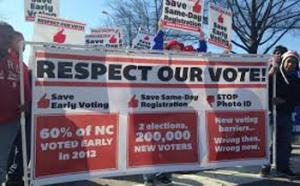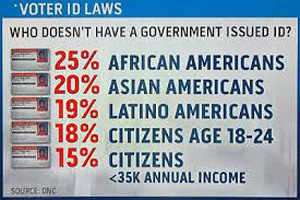
Voting Law changes continue to present challenges in many states that have enacted more restrictive requirements in order for citizens to exercise their right to vote. Many of the voting law changes are seen as being more harmful and punitive to minorities. This seems to be the case in North Carolina.
Civil rights activists opposed to North Carolina's dramatic voting law changes will use the ballot box and the courts to try to overturn them after a judge refused to block them from being used, attorneys for the state NAACP said Monday.
A U.S. District Court judge declined late last week to prevent continued implementation of several provisions being challenged in court by advocacy groups, voters and the federal government. But Judge Thomas Schroeder allowed a trial on the constitutionality of those provisions to continue as planned next July, rejecting requests of the state to throw out the three lawsuits.
The provisions, already used in the May primary, eliminated same-day registration during early voting, reduced the early-voting period by a week and eliminated the counting of ballots cast on election day outside of a person's home precinct. Voters also are being told at the polls to prepare for a photo identification requirement in 2016. Political parties also can send in more observers to monitor voting.
The plaintiffs will decide this week whether to appeal the judge's ruling, said Penda Hair, an attorney with the Advancement Project, helping represent the state chapter of the NAACP, churches and voters.
Regardless of the appeal decision, the NAACP and like-minded groups opposed to Republican policies such as the voting law will continue to register voters and help them navigate new restrictions so they can avoid obstacles to casting ballots. They say the changes will disproportionately affect black voters who have benefited from the wider opportunities to register and to vote.
"We are determined that it will not hinder our efforts to continue to ensure full voting participation in the upcoming elections by African-Americans in this state," NAACP legal adviser Irving Joyner said during a conference call, adding that Schroeder's "opinion is not fatal to our efforts."

Supporters of the Republican-backed laws said they will ensure elections are carried out fairly and will discourage voter fraud or the perception that it occurs. North Carolina is part of the "majority of states in common sense protections that preserve the sanctity of the voting booth," said Bob Stephens, a lawyer for Gov. Pat McCrory, who signed the bill into law, soon after last Friday's ruling.
Rallies from the "Moral Monday" movement have highlighted voter registration at recent rallies in Durham and Asheville in what's been called a 100-county effort to boost turnout. Presumably, like-minded voters could defeat GOP incumbents in the legislature who voted for the law.
In rejecting a preliminary injunction Friday, Schroeder wrote that the plaintiffs had not shown in arguments either the likelihood that they would win at trial or that voters would suffer irreparable harm if provisions are used again in November. Attorneys representing the state said last month there was no evidence that registered voters were disenfranchised when the laws were implemented in May.
Those who sued argued the requirement that poll workers ask voters whether they have photo ID and give them information about how to obtain one if they don't by 2016 will cause delays or confusion. But "there is no showing that the 'soft rollout' will cause confusion or undue lines during the November 2014 election," Schroeder said in his 125-page ruling.
An appeal notwithstanding, the coming months are likely to focus on the extent to which state lawmakers must provide to the plaintiffs documents about the process leading up to the bill's passage in July 2013. Schroeder agreed in May with a magistrate's decision that the legislators didn't have absolute immunity from responding to subpoenas seeking such information.
The magistrate now must decide to the extent in which those documents must be released. The plaintiffs will prevail after receiving evidence about "what the General Assembly knew and what they intended," predicted Daniel Donovan, a private attorney also representing the NAACP.
Schroeder also refused a request by U.S. Justice Department attorneys, which joined the case last September, to have federal observers appointed to monitor the November elections in light of the law.
Copyright 2014 The Associated Press.
